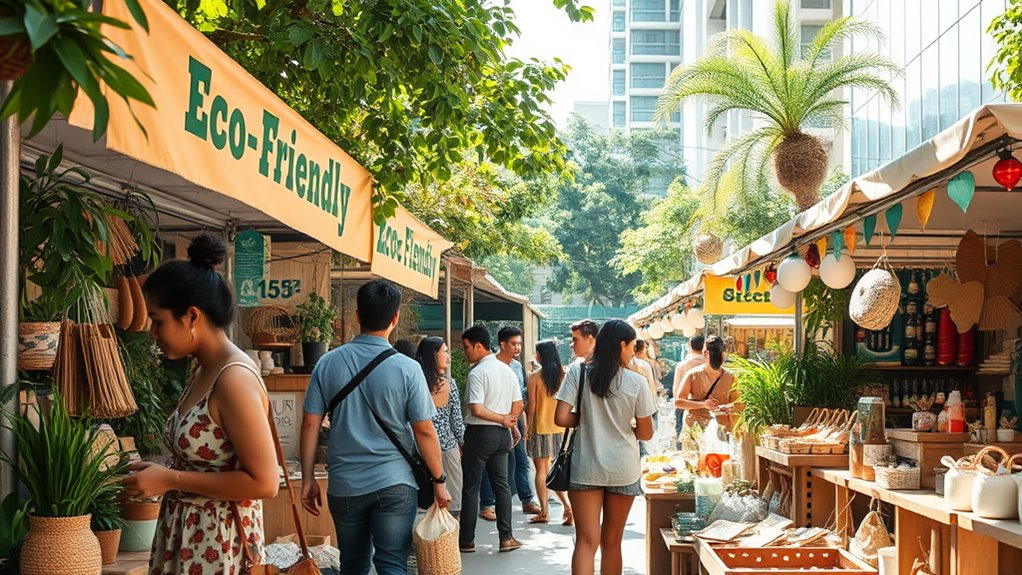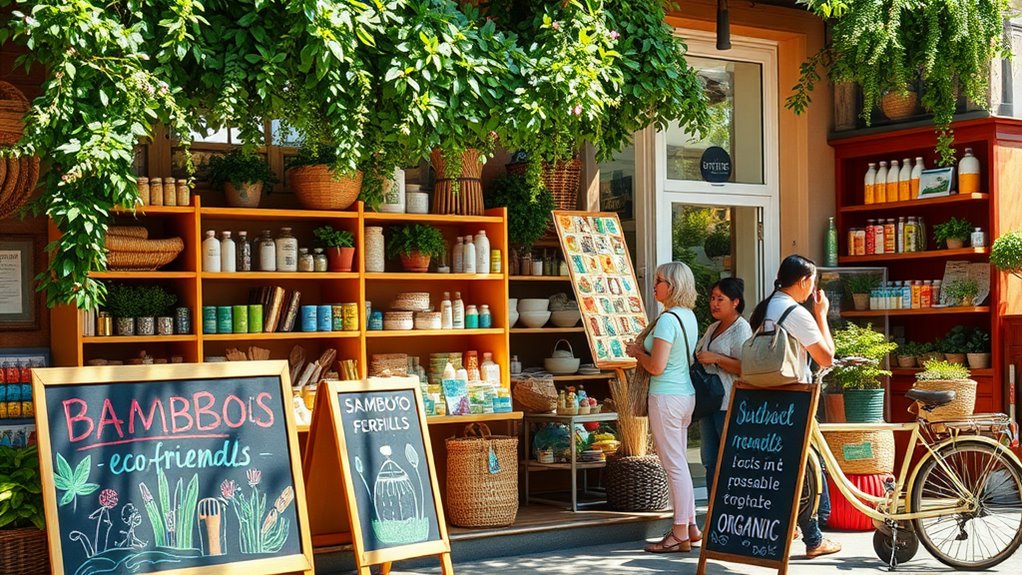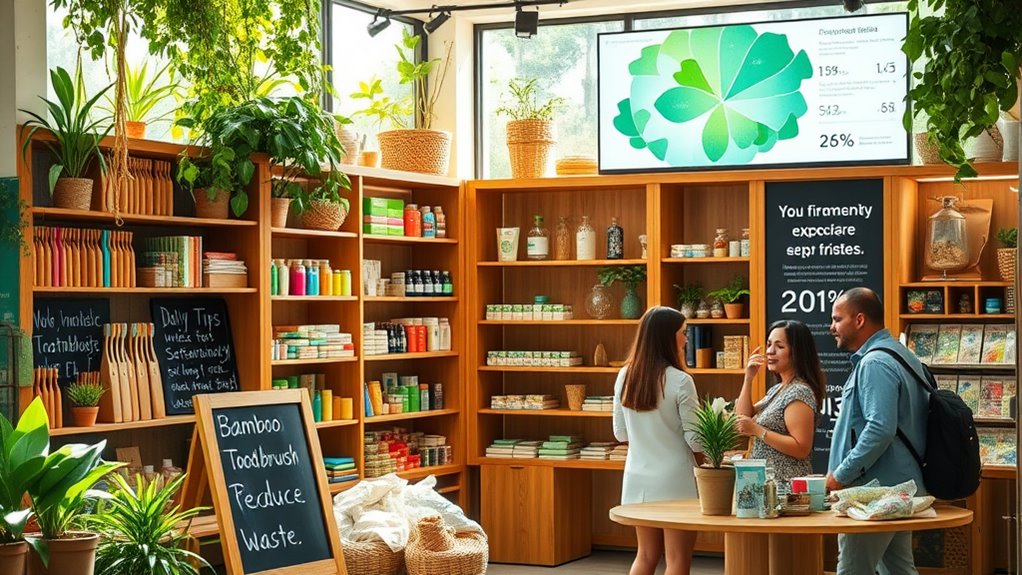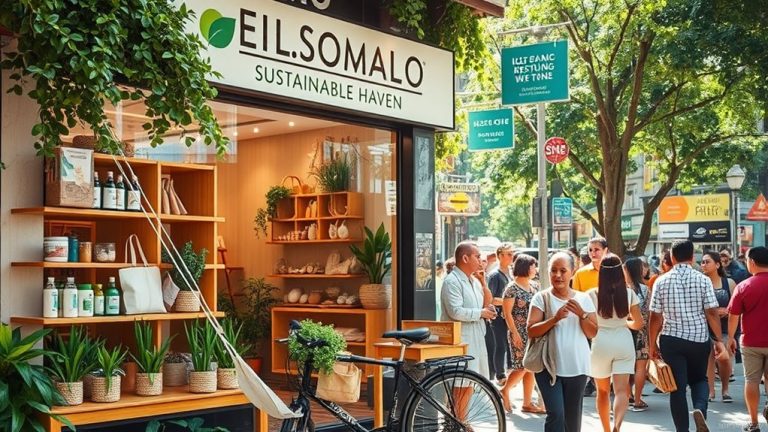If you're contemplating starting an eco-friendly products store in Singapore, you're entering a market ripe with potential. Initially, you'll need to conduct market research to understand consumer preferences and demand for sustainable goods. Crafting a solid business plan is crucial, particularly in relation to sourcing from local suppliers and ensuring your products meet sustainability claims. But that's just the beginning; how do you effectively engage the community and create a brand that resonates? The answers might surprise you as you investigate different strategies for success.
Understanding Eco-Friendly Products
When diving into the world of eco-friendly products, it's crucial to grasp what sets them apart from conventional items. These products are designed with the environment in mind, often crafted from sustainable, biodegradable, or recycled materials.
Think about it: by choosing eco-friendly options, you're not just purchasing a product; you're making a statement about your values.
The global demand for these sustainable options is skyrocketing. A staggering 74% of US consumers prioritize sustainability when they shop, revealing a tremendous market opportunity.
Imagine stocking sustainable office supplies like recycled paper or eco-friendly stationery in your store. Not only will you reduce carbon footprints, but you'll also attract environmentally conscious consumers enthusiastic to support businesses that align with their beliefs.
Plus, offering products with eco-friendly certifications, such as biodegradable packaging or sustainable sourcing labels, can improve your brand's reputation and foster customer trust.
Engage with local artisans who practice sustainable methods, and you'll not only elevate your inventory but also strengthen the local economy.
Adopt this path towards eco-friendliness, and you'll find liberation in every conscious choice you make, both for yourself and the planet.
Researching the Singapore Market
Understanding the Singapore market is crucial for launching your eco-friendly products store. With 74% of consumers prioritizing sustainability, you're stepping into a thriving landscape.
The Singapore Green Plan 2030 aims to transform 80% of buildings into green structures by 2030, presenting a unique opportunity for your business to align with national sustainability goals.
Moreover, research shows that 68% of consumers are willing to pay a premium for eco-friendly options, indicating a lucrative market segment just waiting for your products. As awareness of environmental issues grows, you must cater to this shift in purchasing decisions.
Engaging in local eco-certification programs will improve your store's credibility, attracting the environmentally conscious consumers you want. Certifications are increasingly sought after, and they can distinguish your offerings in a competitive market.
Take the time to investigate what eco-friendly products resonate with your audience. Dive deep into trends, preferences, and the values of your potential customers.
Sourcing Sustainable Suppliers

Sourcing sustainable suppliers is a crucial step in building your eco-friendly products store. To create a vibrant marketplace, you'll want to research both local and international suppliers that prioritize sustainability. Focus on those who use eco-friendly materials and ethical production practices, such as recycled or organic materials.
Here are some effective strategies to find the right suppliers:
- Investigate the GoBusiness portal for government resources that connect you with sustainable suppliers in Singapore.
- Attend trade shows and eco-friendly fairs, like the Singapore Eco Festival, to meet potential suppliers and uncover groundbreaking products.
- Verify suppliers' sustainability claims by checking for certifications such as Fair Trade, Global Organic Textile Standard (GOTS), or Forest Stewardship Council (FSC).
Additionally, consider forming partnerships with local artisans or manufacturers who specialize in sustainable products. By doing so, you'll not only reduce carbon emissions associated with transportation but also foster a community dedicated to eco-friendly practices.
This expedition towards sourcing sustainable suppliers will empower you to create an inspiring store where conscious consumers can find products that truly resonate with their values. Welcome the excitement of this venture!
Developing a Business Plan
Once you've identified sustainable suppliers, the next step is to develop a solid business plan. Start by conducting market research to gauge the demand for eco-friendly products in Singapore. Given that 74% of consumers in the US value sustainability, it's likely your local audience shares a similar mindset.
Craft a compelling mission statement that reflects your commitment to sustainability, especially since 91% of Gen Z gravitate towards eco-conscious brands.
Next, outline your operational plan. Detail your sourcing strategies, highlighting partnerships with ethical suppliers to guarantee quality.
Then, immerse yourself in your financial plan. Determine startup costs, pricing strategies, and potential profit margins, while considering tax incentives that could improve your bottom line.
Marketing Your Eco-Friendly Store

Marketing your eco-friendly store effectively can set you apart in a competitive landscape. By utilizing the power of social media, you can connect directly with the 91% of Gen Z consumers who prefer sustainable companies.
Share engaging content that showcases your products and their environmental benefits. To further entice customers, consider offering discounts for those who bring reusable bags. This not only promotes sustainability but also encourages them to return.
Collaborate with local eco-conscious influencers or bloggers to expand your reach; their endorsements can improve your brand's credibility and attract like-minded customers.
Don't forget to highlight your products' sustainability credentials in your marketing materials, as 74% of consumers value this aspect when making purchasing decisions.
Lastly, organize community events or workshops focused on sustainability topics. This positions your store as a leader in eco-friendly practices and fosters a loyal customer base.
- Utilize social media to share your sustainability expedition.
- Offer incentives for eco-friendly behaviors.
- Collaborate with local influencers to increase awareness.
Engaging With the Community
Engaging with the community is crucial for the success of your eco-friendly products store. By collaborating with local schools and organizations, you can host workshops that spark interest in sustainability and eco-friendly practices.
Picture a lively workshop, buzzing with creativity, as residents learn how to reduce their footprint. Participating in community events like green fairs and markets also allows you to showcase your products to those who value sustainability.
It's a fantastic way to connect with potential customers while sharing your passion for eco-conscious living. Establishing a loyalty program encourages customers to bring reusable bags or containers, fostering a culture of sustainability and building a close-knit community around your store.
Don't forget to provide educational resources on your website and social media. Informing the community about the benefits of eco-friendly products can inspire them and empower their choices.
Moreover, creating partnerships with local charities or environmental groups offers a chance to support initiatives like tree planting or clean-up drives. This not only improves your store's reputation but also solidifies your commitment to being a responsible and engaged business.
Together, you can cultivate a greener future, one step at a time.
Implementing Sustainable Practices

Implementing sustainable practices in your eco-friendly products store isn't just a trend—it's a commitment to your values and the environment. Start by sourcing eco-friendly products made from sustainable materials, such as recycled or biodegradable options, to resonate with conscious consumers. This alignment not only builds trust but also speaks to the heart of your mission.
Consider adopting a robust waste reduction strategy based on the 3R principles:
- Reduce: Minimize excess inventory and waste.
- Reuse: Find creative ways to repurpose materials.
- Recycle: Confirm that your packaging is recyclable.
Additionally, utilizing energy-efficient appliances and lighting can drastically cut your utility costs while lowering your environmental footprint. You could save up to 75% on lighting and 35% on heating or air conditioning!
Encourage your customers to bring their reusable bags by offering discounts or incentives. This simple gesture can foster sustainable shopping behaviors and dramatically reduce plastic waste.
Lastly, engage in local sustainability programs, like the Packaging Partnership Programme (PPP), to enhance your store's credibility.
Navigating Regulations and Compliance
Navigating through the complex landscape of regulations and compliance is vital for your eco-friendly products store. In Singapore, you'll want to familiarize yourself with the Environmental Protection and Management Act, a key framework regulating waste management and pollution control. This knowledge empowers you to operate responsibly and sustainably.
Next, verify your business aligns with the Singapore Green Plan 2030, which sets ambitious sustainability goals. Embracing these initiatives not only enhances your credibility but also resonates with eco-conscious customers.
Don't forget to register your business with the Accounting and Corporate Regulatory Authority (ACRA) to obtain your business license, establishing a solid foundation for compliance.
Consider obtaining Eco Certifications like the Eco Shop Certification. This certification evaluates your store's sustainable practices and acts as a badge of honor, improving your brand's trustworthiness.
Moreover, stay informed about the Packaging Waste Management Regulations. Minimizing packaging waste and encouraging recycling efforts aren't just legal obligations; they're steps toward a greener future.
Measuring Success and Impact

Measuring success and impact in your eco-friendly products store is crucial for long-term sustainability and growth.
By focusing on tangible metrics, you'll create a thriving business that resonates with conscious consumers. Here are some key areas to track:
- Sales Growth: Aim for a 10-15% annual increase in eco-friendly product sales, aligning with the rising demand for sustainable options.
- Customer Satisfaction: Use feedback and surveys to target an 80% satisfaction rate, ensuring your offerings meet the desires of your eco-aware customers.
- Environmental Impact: Calculate your store's carbon footprint, and work towards measurable reductions in waste and emissions linked to your products.
Additionally, monitor customer participation in sustainability initiatives, aiming for at least 50% engagement in activities like recycling programs or community clean-ups.
Don't forget to pursue eco-certifications; obtaining at least one relevant accolade within your initial year will improve your brand's credibility.
Frequently Asked Questions
Are Eco-Friendly Products Profitable?
Eco-friendly products can be highly profitable. As consumer demand rises, you'll find that sustainability attracts loyal customers willing to invest in a better future, enhancing your brand's reputation and your bottom line.
How Do I Start an Eco Business?
Ready to change the world? Start your eco business by identifying your passion, researching sustainable options, and crafting a solid plan. Connect with like-minded suppliers and market your mission to attract eco-conscious customers.
How to Promote Sustainability in Singapore?
To promote sustainability in Singapore, you can engage with local initiatives, collaborate with eco-conscious businesses, and educate your community. Participating in workshops fosters awareness, while adopting eco-certifications improves your brand's commitment to a greener future.
How Expensive Are Eco-Friendly Products?
You might think eco-friendly products cost a fortune, but they're often just a tad pricier than conventional items. With lasting durability and potential savings, investing in sustainability liberates you from wasteful habits.
Conclusion
Starting your eco-friendly products store in Singapore can feel like planting a seed in fertile soil; with care and dedication, it'll grow into something beautiful. By understanding your market, sourcing responsibly, and engaging with the community, you'll not only build a thriving business but also contribute to a greener future. Welcome the adventure, measure your impact, and let your passion for sustainability shine through. Together, we can cultivate a world where eco-conscious choices flourish.
